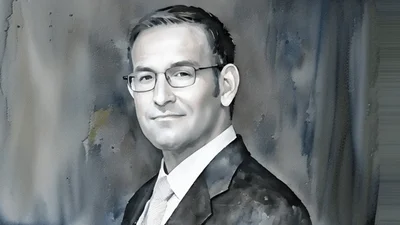Veronique de Rugy is the George Gibbs Chair in Political Economy at the Mercatus Center at George Mason University. She is a nationally syndicated columnist for Creators Syndicate.
Federal Newswire
What impact does government regulation have on the U.S. economy?
Veronique de Rugy
The impact of regulation on economic growth is…pretty well established. There's a lot of “people growth” bashing these days on the right and on the left–it's like it's not important.
In fact on the left they have wanted some de-growth because of the environment. But on the right, there’s this obsession about efficiency. With growth [it] is really misguided. I don't think that there are things that are more important than growth. Growth is the best way to double income per capita in a generation.
There's an ethic to growth where, if you don't have it, a lot of the things that we love that make this country unique like tolerance, peace, and moderation, just goes out the window. This is the impact of regulation.
Federal Newswire
How does growth help beyond creating welath?
Veronique de Rugy
We've mostly focused on the wealth aspect of growth and how yes, it is true. The more growth we have, the more income per capita and those who benefit the most are people at the lower end of the income ladder.
But there's really an ethical aspect. There's a book by Benjamin Friedman at Harvard called “The Moral Consequences of Growth.” It covers the other aspect of growth and what happens when we don't have it.
I think that a lot of the troubles that we have [had] in the last 20 years or so is the product [of] the fact that growth is significantly decreasing. We used to have much higher annual growth and continued growth. We haven't had that in the last 20 years. I think all the tension, polarization, and tribalism that we see is a big product of the fact that growth is slowing.
One of the things that Friedman shows in the book is how this is happening in countries even when they stay rich. With the slowdown of growth you get at all the same negative effects.
Federal Newswire
What problems arise by focusing on more subjective measurements of how well we’re doing?
Veronique de Rugy
It's worth noting that there's a lot of very serious, nonpolitical people who say that we have a problem in the way we measure growth. Measuring something objectively and accurately is hard enough, so far as it is there are people who are saying that we're probably not capturing enough of the welfare and economic impact of things–like Uber, Lyft, and ABS, and app economy–which we don't really have a good measure for.
In the same way as with our GDP measurements, if you hire your deadbeat nephew in your company, his salary doesn't count for GDP. Or if you invest in R&D. That investment doesn't count on GDP until you actually produce something. If you hire a deadbeat nephew to work for the government, his salary counts as GDP.
More importantly, I think one of the big problems we have with a lot of people who are making the case for more government is that they all look at the benefits and never look at the costs.
The cost is what matters. Especially considering the benefits often don't materialize. But the costs are usually more.
Globalization has put consumers at the center of everything. We have this globalization system, and all we get is cheap TV’s. Now we're going to revamp the whole system to have producers and workers at the center. The problem is not that workers and producers are unimportant. The problem is that no production is economically worth it if you don't have consumers willing to actually buy it.
Federal Newswire
What’s the right approach in your view?
Veronique de Rugy
The way to do it right is by directing production in a particular direction. People started thinking consumers were going to be willing to put up with Electric Vehicles. Now, companies are backing away. That's one of the problems with saying, “we're going to incentivize production in a particular direction without letting the market [speak].” It is a huge waste of time and energy to build cars that nobody wants to buy.
The only way to differentiate between productive and unproductive activities is through the market. It's through the forces of the market where consumers and producers interact. It's where the price signal tells you something.
Federal Newswire
You wrote about Congress’ shrinking role on National Review–can you explain your view?
Veronique de Rugy
I wrote a paper a few years ago called “The End of Policymaking.” The case we're making is that Congress is fighting over a part of the budget that is relatively shrinking because Medicare, Medicaid, Social Security and interest on the debt…are growing. [Entitlements] are consuming so much of the budget that the part that Congress is fighting over is shrinking. It's roughly 30% and we're going to head towards 20%.
The parts Congress is fighting over are shrinking and it’s going to be shrinking more as a share of the whole budget. I think we can expect more tension.
Federal Newswire
Even if we managed to increase the country’s GDP to offset the national debt, wouldn’t Congress just spend more money?
Veronique de Rugy
Well the regulatory side of things is different from the spending side of things. I never thought about it this way, but I think it adds up. If all you can do is build on top of a regulatory regime that is already overwhelmingly large, it means that your ability to do something that's radically different is changed. It's actually really small.
Federal Newswire
What does a post-Chevron world look like if could get all of the regulatory folks on board?
Veronique de Rugy
Let me make an analogy. I think our friends who are pro-life didn't prepare for the end of Roe. I think our regulatory friends are not preparing for the end of Chevron.
Someone who really sees things very clearly is the head of Mercatus, Dan Rothschild.
Federal Newswire
How does spending and inflation create shrinkflation?
Veronique de Rugy
Shrinkflation is having prices stay stable but companies [are] selling you less product. We've already litigated this with the size of potato chip bags and Gatorade bottles, but it's also because that's what companies do when there's inflation.
By the way, it's totally legal as long as you inform your consumers.
Blaming companies is a cheap way of trying to distract attention from the fact that government spending is behind all of the inflation. The fact that the Federal Reserve is having a hard time bringing inflation back to target is because Congress isn't helping.
Federal Newswire
How do folks find out more about the Mercatus Center?
Veronique de Rugy
Pretty much everything I do is posted at www.mercatus.org. But I have a creator's column which appears in several papers around the country including Reason. I tweet as well [and my handle is @veroderugy].








